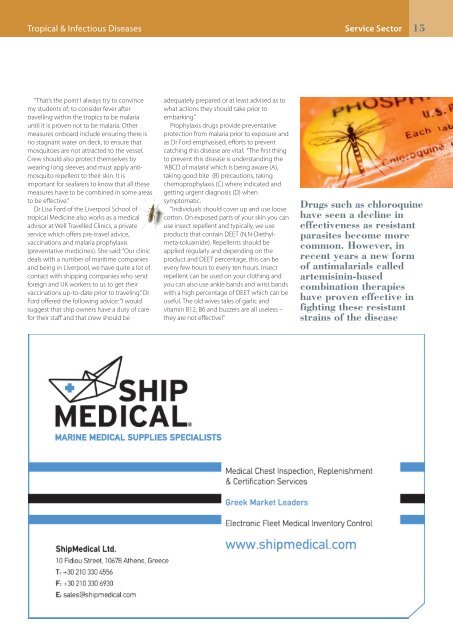You also want an ePaper? Increase the reach of your titles
YUMPU automatically turns print PDFs into web optimized ePapers that Google loves.
Tropical & Infectious Diseases Service Sector 15<br />
“That’s the point I always try to convince<br />
my students of; to consider fever after<br />
travelling within the tropics to be malaria<br />
until it is proven not to be malaria. Other<br />
measures onboard include ensuring there is<br />
no stagnant water on deck, to ensure that<br />
mosquitoes are not attracted to the vessel.<br />
Crew should also protect themselves by<br />
wearing long sleeves and must apply antimosquito<br />
repellent to their skin. It is<br />
important for seafarers to know that all these<br />
measures have to be combined in some areas<br />
to be effective.”<br />
Dr Lisa Ford of the Liverpool School of<br />
tropical Medicine also works as a medical<br />
advisor at Well Travelled Clinics, a private<br />
service which offers pre-travel advice,<br />
vaccinations and malaria prophylaxis<br />
(preventative medicines). She said: “Our clinic<br />
deals with a number of maritime companies<br />
and being in Liverpool, we have quite a lot of<br />
contact with shipping companies who send<br />
foreign and UK workers to us to get their<br />
vaccinations up-to-date prior to traveling.” Dr<br />
Ford offered the following advice: “I would<br />
suggest that ship owners have a duty of care<br />
for their staff and that crew should be<br />
adequately prepared or at least advised as to<br />
what actions they should take prior to<br />
embarking.”<br />
Prophylaxis drugs provide preventative<br />
protection from malaria prior to exposure and<br />
as Dr Ford emphasised, efforts to prevent<br />
catching this disease are vital: “The first thing<br />
to prevent this disease is understanding the<br />
‘ABCD of malaria’ which is being aware (A),<br />
taking good bite (B) precautions, taking<br />
chemoprophylaxis (C) where indicated and<br />
getting urgent diagnosis (D) when<br />
symptomatic.<br />
“Individuals should cover up and use loose<br />
cotton. On exposed parts of your skin you can<br />
use insect repellent and typically, we use<br />
products that contain DEET (N,N-Diethylmeta-toluamide).<br />
Repellents should be<br />
applied regularly and depending on the<br />
product and DEET percentage, this can be<br />
every few hours to every ten hours. Insect<br />
repellent can be used on your clothing and<br />
you can also use ankle bands and wrist bands<br />
with a high percentage of DEET which can be<br />
useful. The old wives tales of garlic and<br />
vitamin B12, B6 and buzzers are all useless –<br />
they are not effective!”<br />
Drugs such as chloroquine<br />
have seen a decline in<br />
effectiveness as resistant<br />
parasites become more<br />
common. However, in<br />
recent years a new form<br />
of antimalarials called<br />
artemisinin-based<br />
combination therapies<br />
have proven effective in<br />
fighting these resistant<br />
strains of the disease


